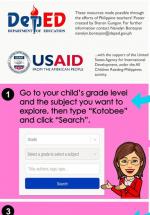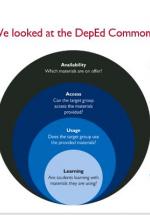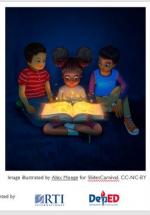English
Reopening Classrooms Interview Series

This playlist was part of a knowledge sharing activity organized by the All Children Reading (ACR) Philippines project regarding countries' experiences re-opening schools on the occasion of the 4th education forum of the Department of Education. This forum is a platform to share updates of major on-going reform initiatives of the Department with development partners including USAID and a venue to inform, deliberate on and coordinate efforts and actions towards quality basic education. Staff of ACR-Philippines interviewed education stakeholders in the Kingdom of Cambodia, the Dominican Republic, Romania, the United Arab Emirates and United States about what happened when they reopened classrooms. Representatives spoke with us about their experiences, including the preparations they have made—what worked and what did not work. They also describe the challenges that they have encountered and how they managed these issues.

Learning at Scale Interim Report

The Learning at Scale study was designed to identify existing early grade reading programs with demonstrated impact on basic skills at scale and to conduct in-depth investigations of these programs to determine what makes them successful. After an extensive search, eight programs (spanning seven countries) were selected for inclusion in the study. Research on these programs has been conducted in order to answer the three overarching research questions, focused on understanding the components of instructional practices, instructional supports, and system supports that lead to effective instruction.
Learning at Scale data collection activities for some of these programs were delayed due to COVID-19. However, with demand for information about how to implement effective interventions at large scale at an all-time high, we believe that the timely sharing of findings from Learning at Scale is essential. Accordingly, this interim report provides preliminary findings from our study to date, highlighting key high-level findings across all eight programs, as well as quantitative and qualitative findings from primary research for select programs.
The Learning at Scale study is led by RTI International, as part of the Center for Global Development (CGD) education research consortium, funded by the Bill and Melinda Gates Foundation.

Accessing eResources on the DepEd Commons

This infographic describes how to find early literacy resources in multiple languages, which were developed by Philippine teachers with support from the USAID/All Children Reading activity in 2020-2021

DepEd Commons and dissemination of eResources: a SWOT analysis [Presentation]

This presentation was delivered at the 2021 mEducation Alliance Symposium in a panel on the subject of education technologies for basic education in the Philippines.

Developing eResources for Early Literacy and Numeracy [Presentation]

This presentation was delivered at the 2021 mEducation Alliance Symposium in a panel on the subject of education technologies for basic education in the Philippines.

Project Reconnect - Final Report

This is the final report for Project Reconnect, a bold and ambitious effort conceived by Google Germany, Google.org,
and NetHope in late 2015 that aimed to help refugees as they rebuild their lives in Germany by facilitating access to online education, language learning,
culture learning, and information resources.
This report was written by RTI International and based on data from 50 grantee organization reports, 320 Chromebook location managers, and 304 refugee
Chromebook users, highlighting achievements and lessons learned from the program.

Learning to Thrive: Education, opportunity and foundational skills in El Salvador [CIES 2021]

The El Salvador Early Grade Reading Assessment (EGRA) was conducted in 2018 in late June and early July 2018 (toward the end of the El Salvador school year, which runs from January to October). The objective was to provide the Government of El Salvador with information on the reading performance of public school students in second and third grades. The sample was designed to represent government schools at the national level with a minimum enrollment of six students in each of the second and third grades and all of the second and third grade students in these grades. EGRA is an individually administered oral assessment of foundational reading skills; in Spanish, the skills tested include letter sound identification, familiar word reading, and oral reading fluency, among others.
Closing early learning deficits in contexts like El Salvador is critical to improving economic development. According to a World Bank review of the causes of dropout in Central America, skills gaps that are not corrected through additional support and remediation compound over time. Students with weak foundational skills are more likely to struggle and become disinterested as content becomes more complex. As students age, they also face rising direct and opportunity costs and increased risk of teenage pregnancy and violence. Together these factors are associated with higher levels of grade repetition and school dropout. Analyzing El Salvador household survey data, the same report indicated that 40% of youth who had left school cited lack of interest while 25% reported economic causes as the main reasons for dropping out of school. Among girls, personal reasons, including pregnancy and caring for younger siblings, are the highest reported cause at 32%.
The EGRA results indicate that 49% of second graders and 40% of third graders are reading at or below a rate of one correct word per second. Students performing at this level for oral reading fluency are identified as “At Risk” for developing later reading difficulties, and potentially school failure. This means that additional remediation steps, such as intensive instruction and frequent progress monitoring, are needed to increase the chances that these students catch up with their peers. Early skills gaps are associated with higher levels of grade repetition and in contexts like El Salvador, where primary completion is not universal, school dropout. On nearly every component of the assessment, boys, students in rural schools, students from lower-income groups, and students with some form of self-reported disability all scored lower than their more advantaged peers. Income disparities were especially noteworthy: Students in the lowest income group were more than three times as likely to score zero on the oral reading fluency passage relative to students in the highest income group (20% versus 6%).

Teacher Language and Literacy Assessment: Final Report

The Research for Effective Education Programming – Africa (REEP–A) Task Order, awarded in September 2016, is a five-year project within the United States Agency for International Development (USAID) Africa Bureau. The primary objective of REEP–A is to generate and effectively disseminate Africa regional and country-specific education data, analysis, and research to inform the prioritization of needs and education investment decisions.
One research focus under REEP–A is to explore how teachers’ language proficiency and literacy in the language of instruction (LOI) influence students’ learning outcomes. It is hypothesized that the teachers’ level of language proficiency and literacy in the LOI can either facilitate student learning, if high; or impede learning, if low. However, limited data are available on how teacher language and literacy skill levels precisely relate to student outcomes.
Exploring this relationship requires having a valid and reliable tool to measure teachers’ language and literacy skills. USAID therefore commissioned the development of the Teacher Language and Literacy Assessment (TLLA) to assess teachers’ language proficiency and literacy in the required LOI. The TLLA, adaptable to any language, consists of subtasks assessing speaking, listening, reading, and writing, as well as vocabulary and grammar, in the language(s) used for teaching and learning at the primary school level in a given context. It is envisioned that policymakers, researchers, and other education stakeholders can use the TLLA to collect data on teachers’ linguistic assets and gaps in the languages that their role requires them to use. These data could be useful for identifying factors contributing to student learning outcomes, informing teacher training and professional development needs, designing teacher deployment policies, and evaluating the impact of interventions aimed at improving teachers’ or students’ language and literacy skills.
The aim of this report is to present the new tool and disseminate the initial findings around its technical adequacy. The international community has directed considerable effort to assessing and understanding the impact of language on students’ literacy and language skills, and the TLLA is a complementary tool
that shows promise for understanding teachers’ language assets and needs.

A Research Framework for Capturing Teachers' Decision-Making [CIES 2021 Presentation]

The purpose of this session is to articulate a research framework that centers teachers’ voices when trying to understand how teachers use curriculum materials in the classroom. Operating in the context of highly structured lesson plans, the approach identifies ways in which teachers exercise their professional discretion to modify the lesson and frames conversations to elaborate the motivations driving the teachers’ choices. The approach has been iteratively refined across three studies; taken together, the studies provide evidence for the value of listening to teachers and being responsive to their voices during implementation.
The research framework uses the lens of modifications, or changes to the intended lesson plan implemented within one class period. Modifications can be large or small, additive or subtractive. For example, in a lesson with a section for independent student practice, a large modification might be skipping the practice section entirely. Or, during a lesson focused on blending of initial sounds using 3 example words, a small modification might be extending the exercise by adding extra words. Researchers observe the lesson, noting any modifications; after the lesson, the researchers select some of the modifications and ask the teachers why they made the choices they did. Analyses of teachers’ explanations highlight the importance of understanding why teachers make the choices they do. For example, a teacher who skipped the independent practice section because they don’t think their students are ready to do the skill on their own suggests that the teacher is exercising agency and using her knowledge of her students to inform her decision-making. Insights such as this one can guide decisions on projects. It may be that while the intention of the teacher was guided by knowledge of students, the end result is not desirable from the project’s point of view. Understanding why the teacher made this choice provides implementers with better and targeted ways to address choices that impact the overall goals of the project.
In this presentation, we draw on data from an exploratory case study to understand use of new mathematics materials in Liberia, a more in-depth case conducted in Malawi on teacher use of reading materials, and finally, a systematic study examining how reading teachers use materials across four Sub-Saharan African countries. We use each case to highlight both an aspect of the research framework and instances of modifications to project implementation driven by teachers’ voices.
By focusing on teacher voices, we disrupt the deficit notion that teachers are “resistant” to change, or do not “understand” new pedagogies. Instead, we aim to value teacher voices and integrate their insight into implementation programs. By doing this, we not only raise the likelihood of successful use of new materials and pedagogies, but we also develop more responsive pedagogy that better matches existing classroom cultures.

Language Complexity in the Philippines [CIES Presentation]

Presentation delivered at CIES.This study attempts to determine whether or not the complexity of the L1 should be a factor in interpreting reading achievement in multilingual contexts, as well as in planning early grade reading teaching and learning materials and curricula in settings with complex languages.

